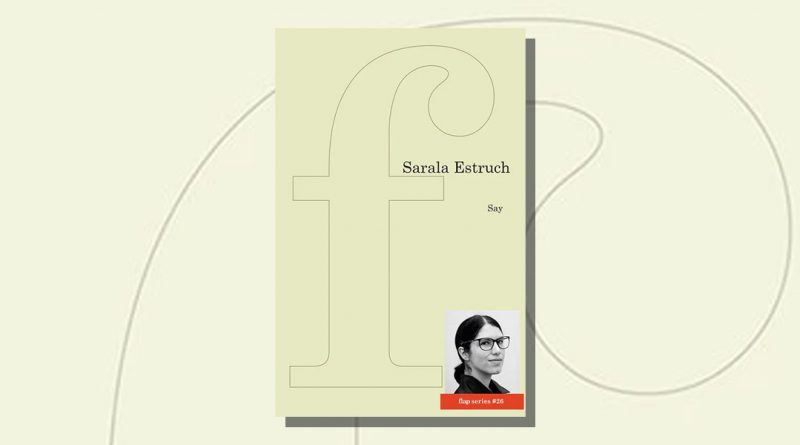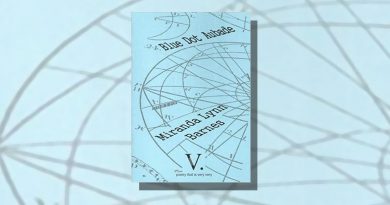Say by Sarala Estruch
-Reviewed by Emma Lee-
Through the poems in Say, Sarala Estruch explores subjects such as losing a father as a young
child, mixed-race identity, living up to family expectations – some of which are one generation
assuming (incorrectly at times) what an older generation’s reaction might be – and interracial
relationships. That sounds like a huge demand on a pamphlet of 20 poems, however, Estruch
distils the topics through the lens of one family so it doesn’t feel as if these are poems on big,
important topics that drown out the poems.
In ‘After Silence, the Return of Song,’ questions overwhelm a child for whom bereavement can be confusing:
“Silence: a river that smothers.
Till you begin to search – first, the usual places:
desk drawers, filing cabinet, under the bed. Then:
the inside of a bag of basmati, the fold in the skin
behind your ears, the dark curving tunnel
of your throat. Eventually, you give up and find it
jammed between your steepled palms – not words
but the bribe required to coax words from hiding.”
How does a child express their thoughts when they have never encountered bereavement and
don’t always understand their father is not going to return? Children are also aware that the
adults around them are sad and preoccupied so are often reluctant to cause further upset with
questions that might get an emotional reaction rather than a direct answer. It becomes easier to
wrap those thoughts and questions in a package and leave them untouched. In ‘denial (ii)’,
“sutured my lips wanted
no one’s pity freakish child one parent
only wanted to unseam
memory pick apart our connection”
For a mixed-race child, being different is a source of disconnection from other children at school,
at best it leads to being questioned, at worst, bullied. To have another reason to be different, one
parent instead of two, gives another reason to be subject to intrusive questions or pity.
In the next poem in the sequence, ‘denial (iii)’, the child “was an inconsolable little autocrat of
loss/ he had been my father and not her husband”. The child doesn’t see that her mother has
suffered loss too. Instead of grieving alongside her mother, she isolates. The poem’s last line,
“my mother’s grief a distant country i couldn’t imagine”. The child is aware the mother is
grieving but they don’t seem to be consoling each other.
The bereavement brings mother and daughter closer to the older generation, her Indian
grandparents. In the poem ‘Freight’ she learns that certain things are “forbidden”
including “my best friend (who is Black)” and others are “permitted” including “My best
impression/ of a Good Indian Girl.” This comes to a head when the daughter gets her hair cut
before going to stay with her Indian grandparents. As her mother frets about what relatives will
think, the daughter packs scarves and hats in case. This isn’t a minor worry about what
impression it will create. The family are Sikh so cutting hair is against the religion’s teachings.
The daughter travels to India as a bag of nerves only to discover the relatives think she looks like
a sleek, modern woman and approve.
The daughter grows up to have a family of her own. Travelling from London Heathrow to Indira
Gandhi International airports, she shows the family passports to the man behind the immigration
counter in ‘Return’,
“He shuffles papers. Sweat pearls my upper lip.
Why do I suddenly feel like a fraud? He enunciates
my name the way Indians do, with a hard rolling ‘r’
I can’t replicate. ‘Yes. My father was Indian.’
He is incredulous. ‘And where is your husband from?’
‘Jamaica.’ The immigration man is half-amused,
half-bemused. ‘The children are very mixed,’ I grin.
‘They are universal,’ the officer says, handing us
our papers. The gate opens, and the room is shining,”
The shining room indicates the warmth of feeling welcome rather than meeting hostility and
questioning.
Even the most British of things, like the rose, is not as pure as it would seem. In ‘I research the
origins of the modern rose & discover’, the first on the list is “she is a crossbreed” and only one
variety is native to Britain, the others “shipped from China, India, France”, the list continues:
“7. Flower with a thousand faces, six thousand five hundred tongues
8. & almost as many names;
9. ancestors estimated at thirty-five million years old.
10. To where does she return?
11. She becomes what she is”
The last line lists the word rose in Chinese, Hindi and French/English, different names for the
same flower. Different but universal.
One of the last poems is a letter to the poet’s father, a regret that although her children have met
their great-grandparents, they never met their grandfather. Although she still feels her father’s
presence in her grandparent’s (his parents’) home:
“ These rooms pulse with you,
motes of thought and feeling still in motion, the way a person lingers in the fabric
of carpets, the plaster of walls, long after they have left. It feels so good to have
arrived home; by which I mean I have belonged here once, perhaps I can belong
here again.”
Say takes its starting point as Audre Lorde’s question ‘What do you need to say?’. It
concludes the most important things that need to be said often need coaxing from vague
thoughts into fully-formed words and are usually about things we avoid saying, whether those things are
grief or colonialism or friction between what is expected of us and what we want or need to do.
Estruch uses personal situations to illustrate universal themes, making her poems accessible to a
wide readership without dumbing-down or shying away from taboo subjects.



